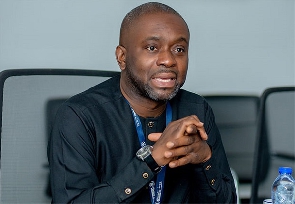 Edward Nana Yaw Koranteng, CEO of MIIF
Edward Nana Yaw Koranteng, CEO of MIIF
Chief Executive of the Minerals Income Investment Fund of MIIF, Edward Nana Yaw Koranteng, lamented the low level of earnings that Ghana makes out of royalties.
He said, "92% of our royalties are coming from gold, so there is a leaning towards gold because that is where we have our most royalties. So, that is the problem. If you look at the quarry sector, it is in line with our economic and infrastructure development."
Read the full story originally published on April 2, 2022, by GhanaWeb
Chief Executive of the Minerals Income Investment Fund of MIIF, Edward Nana Yaw Koranteng, has noted that Ghana only realized about GH¢3.8million out of the expected GH¢100million annually in royalties from the quarry.
According to the Fund, this is because the country is overly dependent on gold resources.
He made the remarks when he spoke to CitiNews at the opening of the 2022 Ghana Mining Week and Gold Expo in Takoradi.
Edward Nana Yaw Koranteng said, "92% of our royalties are coming from gold, so there is a leaning towards gold because that is where we have our most royalties. So, that is the problem. If you look at the quarry sector, it is in line with our economic and infrastructure development."
"So, as far as you have the infrastructure and economic development growth, there should be a corresponding increase in its royalties. We are supposed to have about GH¢100 million in royalties annually. In a worst-case scenario, we should have at least GH¢3.5 million to GH¢56 million, but in 2020 we had only GH¢3.6 million, which means there is a big problem with the quarries ", he said.
He also noted that this is a result of invasion by foreigners, underpricing, lack of capital, and encroachment by settlers within the catchment of quarries.
"We have identified four main problems with the quarries; If we have to expand the royalties net and add value to the quarries sector, then we need to properly strategize. So, for me to get GH¢100 million royalties annually from the quarries, there are a few things we are doing now."
Thus, we are trying to support the quarry sector by introducing what we call de-risking mechanisms, which is essential to provide guarantees to banks that desire to support the quarry sector", he added.